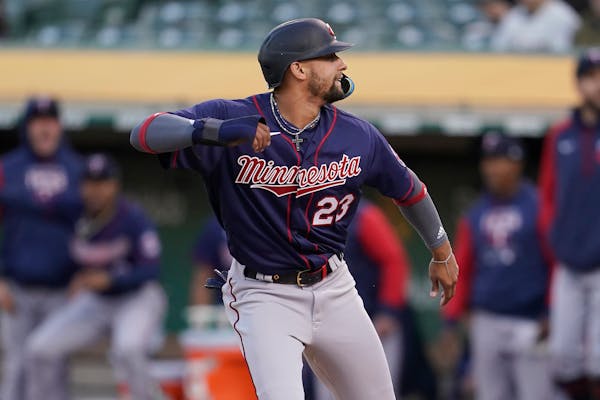 See
more of the story
See
more of the story
Now that the Twins have had a few days to digest and process deflating news that top prospect Royce Lewis suffered another serious knee injury, an unavoidable conversation has suddenly become a pressing matter.
What is the plan at shortstop now?
Along those lines, an important question for Carlos Correa: Are Jucy Lucys still hitting the spot?
The Twins can only hope that Correa is enjoying his time in Minnesota as much privately as he appears to be publicly and is considering making this market a home more than a layover, because the picture is awfully murky at present.
Before Lewis crashed into the center field wall at Target Field last weekend, the organizational direction at shortstop looked clear: If Correa chose to opt out of his contract after this season — as many predict — Lewis would slide in and a new era would begin.
But now?
With Lewis facing a 12-month recovery and Correa's opt-out potential lingering, a gigantic question mark hangs over that critically important position.
First, a thought on Lewis. I criticized the team after it demoted him back to St. Paul rather than allow him to stay and play other positions once Correa returned from injury. I still believe his injury was more terrible luck than being unfamiliar with center field, but the fact Lewis reinjured his knee playing out of position supports those who argued that he should have stayed at his natural position.
This is a tough blow for Lewis professionally, and it puts a hole in the organization's safety net if Correa decides to test his market again this winter. The Twins have three options in determining how to proceed:
One, hope that Correa does not opt out, which seems unlikely considering business logic, Correa's stature in the game and knowing that he wanted a long-term deal before agreeing to a shorter term with annual opt-out clauses.
Two, offer Correa a long-term contract and hope he accepts it.
Three, piece it together next season (or longer) if Correa leaves, which is not an attractive plan under any circumstance, much less for a team striving to become a credible contender.
The answer is easy.
Tell the Pohlad family to back a Brink's truck into Correa's driveway. Do whatever it takes to convince him to sign a long-term contract, even if that requires offering him the richest contract in team history and a lifetime supply of Jucy Lucy's, which he professes to love.
Correa is worth a landmark deal. He's a superstar whose impact on the lineup and the clubhouse is undeniable. Pairing him with Byron Buxton gives the Twins two of the most dynamic stars in baseball.
By all accounts, Correa is happy in a Twins uniform, but it's naïve to think that he won't exercise his opt-out clause in pursuit of a long-term contract. What player would turn down, say, eight years of guaranteed money in a new deal in favor of two seasons?
The Twins should win their division, so trading Correa for a haul is off the table. The only sensible move is to try to lock him up long term.
At what cost? Again, whatever it takes.
The Pohlad ownership's reputation is such that fans expect frugality, but that's not always been the case. They showed financial aggressiveness in signing Joe Mauer for $184 million, as well as big-ticket splurges on Josh Donaldson, Correa and Buxton more recently.
This is a chance to show that type of commitment. The price tag will exceed $200 million if Correa seeks a term of more than five years. Locking into contracts that extend far into the future always brings risk, but superstars don't just fall out of trees.
Correa turns 28 in September. His prime years are still wide open. If he were signed long term, the Twins could move Lewis to third base or another position.
Lewis has been regarded as the shortstop of the future, but his second knee surgery complicates that plan. The focus and intention should be on keeping Correa in that spot for as long as possible.






